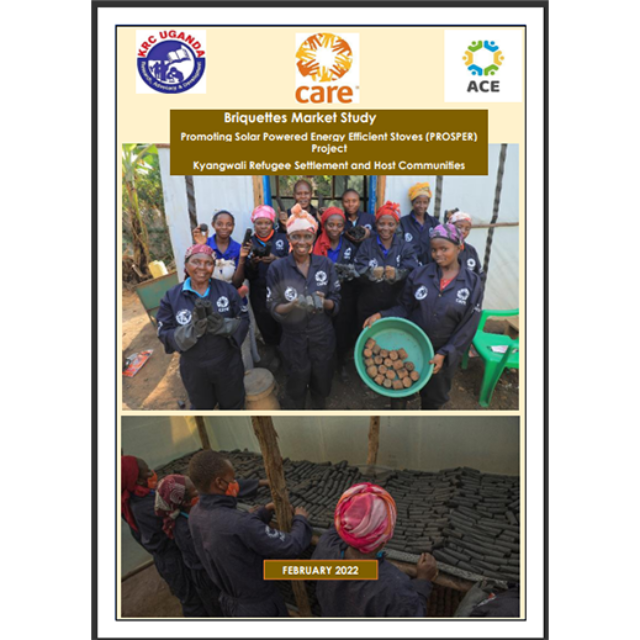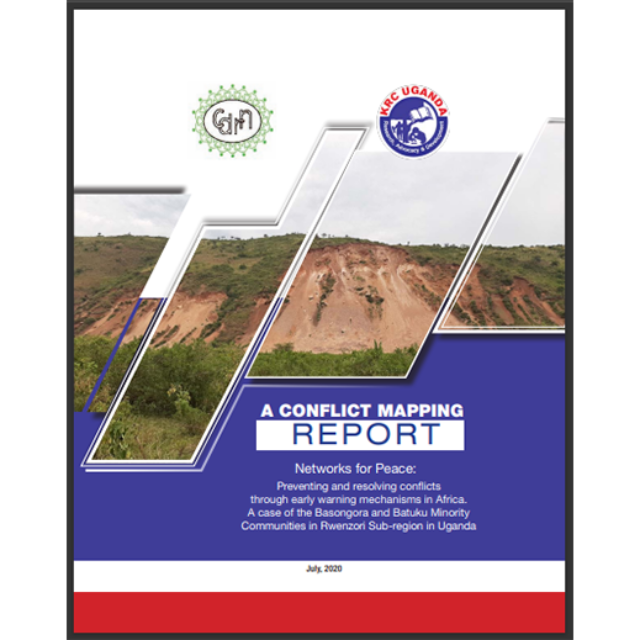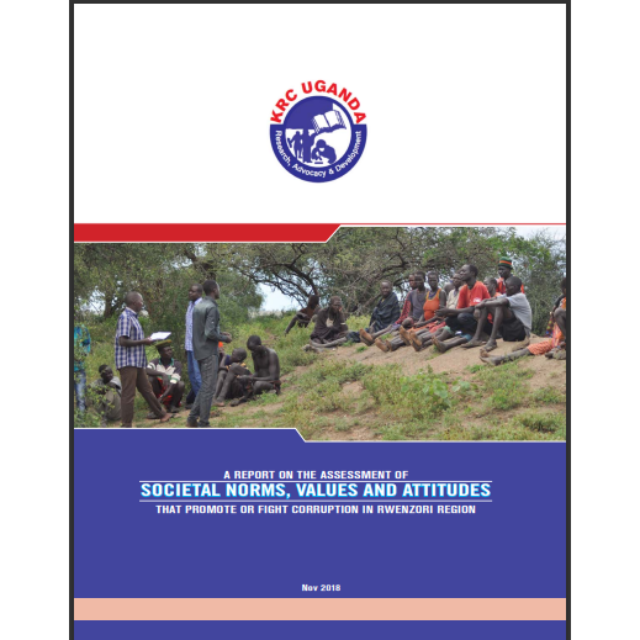Posts: Information, Research & Communication

Briquettes Market Study Promoting Solar Powered Energy Efficient Stoves (PROSPER)
The following are the objectives of this strategyi. To ensure accessibility of quality briquettes for wider use at ease-of-reach pointii. To ensure affordability of quality briquettes by bringing down it priceiii. To create awareness and sensitize masses on feasibility of using quality briquettesiv. To support scaled up quality briquettes production as a panacea to bring down the pricev. Strengthening public private partnerships in quality briquettes production andmarketingvi. Integrate and mainstream cross-cutting issues in wider quality briquettes production (including women, children, persons with disability, reducing gender based violence, saving the environment from degradation as well as contributing to reduction of HIV/AIDS) … Click to access Full Report

A CONFLICT MAPPING REPORT
This is a report of the Conflict Mapping for the Network for Peace: Preventing and ResolvingConflicts through Early Warning Mechanism in Africa Project being implemented in Kaseseand Ntoroko Districts located in the Rwenzori Sub Region of Western Uganda. The projectis jointly implemented by Community Development Resource Network (CDRN) and KabaroleResearch & Resource Centre (KRC Uganda) in Ntoroko and Kasese Districts respectively,with financial support from the UK aid in partnership with Minority Rights Group International(MRGI) …Click to access Full Report

A Report on the Assessment of Societal Norms, Values & Attitudes that promote or fight Corruption in Rwenzori Region
This study sought to find out the societal norms, values and attitudes that promote or fight corruption in Rwenzori region. The study was commissioned by Kabarole Resource and Research Centre (KRC) with the funding from Democratic Governance Facility (DGF). The scope extended to include the eight districts (Kabarole, Kyenjojo, Bundibugyo, Ntoroko, Kamwenge, Kyegegwa, Bunyangabu, and Kasese) … Click to access The Full Report

THE IMPACT OF THE CREATION OF NEW ADMINISTRATIVE UNITS ON SERVICE DELIVERY IN RWENZORI REGION
Kabarole Research Center (KRC), with funding from Democratic Governance Facility (DGF), is implementing a three year Civic Education Project in the Rwenzori region under the title “Enhancing People Power for Transformative Leadership in the 8 Districts of the Rwenzori region”. The project aims at achieving a civically competent citizenry with ability to demand for a more responsive and accountable state; to increase citizens’ knowledge on civil and political rights and to increase government capacity to respond to citizens demands. To achieve these aims, KRC conducted researches on pressing governance issues in order to generate evidence that can be used by citizens and leaders to make appropriate choicesand decisions in planning, policy formulation and effective implementation of development programs for effective service delivery at community levels. In this context, this research sought to interrogate the claim that decentralization and the creation of new administrative units have brought services closer to the people and empowered them through participation on the governance landscape. This is against the backdrop of the immense criticism leveled against the creation of new administrative units which pundits argue has laid a heavier burden onto the tax payer … Click to access The Full Report

THE MELTING POT: Land Conflicts in the Rwenzori Region
This study examines the centrality of land in the conflict situation in the Rwenzori region of western Uganda. By exploring the factors underlying the incidences of land conflicts, the study derives vital implications of these conflicts to the region’s peace and security situation. The findings indicate that land remains at the centre of the prevailing conflict narrative in the Region. Notwithstanding the narratives that may mask land, such as references to ethno-political and sociolinguistic pluralities and antagonisms, land is the fulcrum around which these struggles revolve. Narratives like ethnic tensions have been researched and told time and again, thus masking the fundamental problem: land governance. Land conflicts tend to draw many different people and agencies into their fold, thus impacting on the peace and security measures and potentialities in the region’s entire community. The study proposes institutional and structural measures for overcoming these interlocking conflicts. …Click to access The Full Report

PROFILING OF AGRICULTURAL CROP MARKETING COOPERATIVES AND ASSOCIATIONS AND THEIR SUPPORT ORGANISATIONS IN THE RWENZORIREGION
The profiling study was conducted to document the status of marketing cooperatives andassociations in Rwenzori region with an objective to improve understanding of their scope andscale, the range of services they receive and offer with the associated terms and conditionsand in turn, determine how best to support them while improving the synergy of BD partnersand the food cluster members of the Rwenzori regional Development Framework …Click to access Full Report

FOOD CONSUMPTION DYNAMICS OF THE URBAN POOR IN FORT PORTAL MUNICIPALITY
This report provides an analysis of the street food system in Fort Portal town . The study drawsattention to the consumption dynamics of the urban poor to bring new insights into the currentglobal food debate framed on population forecasts and the related production narrative.Through a consumer survey, interviews and focus group discussions with the urban foodvendors and the different consumer segments. The evidence suggests that food security andnutrition, particularly for the urban poor is not just about addressing food production … …Click to read The Full Report

STUCK INTHE MIST: Contextual Analysis of the Conflicts in the Rwenzori Region
The Rwenzori region consisting of 7 districts (Kabarole, Kyenjojo, Kamwenge, Kasese, Kyegegwa,Ntoroko and Bundibugyo) of Western Uganda has for decades been characterized by conflicts associatedwith cultural and ethnic differences that exist among the people of the region. The conflicts betweencultural groups have always raised questions about governance; leadership and fairness in the sharingand use of natural resources e.g. land. Although the recent conflicts could have some connection withhistorical incidents in the region, they possess a distinguishable character of their own. The currentconflicts between ethnic groups have been triggered by the recent reintroduction and recognition ofcultural leadership. This recognition and facilitation by the government of Uganda resulted into there awakening of historical conflicts, the feeling of inequality between ethnic groups and the fearsthat certain cultural groups will have little or no share in the natural resources including the recentlydiscovered oil and gas. … Click to access Full Report

Enhancing the adaptive capacity of communities to climate change through IWRM, Mpanga Catchment of the Nile Basin in Uganda
The Project – supported by UNEP – was implemented in the upper Nile Basin, in Uganda. The Mpangacatchment where activities were rolled out is part of the Lake George Basin / The Lake Albert WaterManagement Zone and is located in the west of the country. This Mpanga catchment has an estimatedsurface of approx.4700 km2, and is characterized by a diversity of landscapes and high ecologicalsignificance. The area stretches over the territory of these 3 Districts. … Click to access Full Report

MAIZE GRAIN VALUECHAIN IN RWENZORIREGION IN UGANDACONSTRAINTS AND OPPORTUNITIES
The Rwenzori Regional Think Tank initiative brought together Rwenzori regional agriculture stakeholdersthat reflected on the challenges facing agriculture sector in the region. Research was seen as oneof the mechanisms through which knowledge can be generated to inform decisions and actions forimproving agricultural productivity. It was against this background that study to identify constraintsand opportunities in the maize grain value chain in Ruwenzori region was done. This research onmaize trade was conducted to provide a precursor for in-depth value chain analysis. A survey of buyersin the districts of Kyenjojo, Kabarole, Kamwenge, Kasese and Bundibugyo as well as Buyers inKampala was conducted. Data about trade volume and prices from 2007 to 2009 was collected. A totalof 399 buyers (stores and traders) in Rwenzori region and a total of key buyers in Kampala wereestablished. This big numbers of buyers include both small and large scale operating in the districtsof Kyenjojo, Kabarole, Kamwenge and Kasese. …. Click to access The Full Report

Small holder farmers’ knowledge and adaptation to climate change in the Rwenzori region
The Rwenzori region has in the past couple of years been on the local, national and international spotlight as a region already affected by climate change. Various studies in the Rwenzori region have indicated that agricultural products will be affected negatively by climate change. There is a plethora of reports and manuals about climate change adaptation and mitigation in climate change prone areas. Knowledge about climate change is an important factor in climate change mitigation and adaptation. This investigation aimed to investigate small holder farmer’s knowledge and their adaptation strategies in the Rwenzori region. …Click to access Full Report

SOIL FERTILITY ANALYSIS AND AGRONOMIC PRACTICES FOR BANANA ENTERPRISE MANAGEMENT IN THE RWENZORI REGION
The East African highland banana (Musa spp. AAA-EA) is a primary food and cash crop in Uganda. Despiteits importance, yields on farmer’s fields remain poor in the region compared to that on research stations.Quantitative information on the status of soil fertility in banana land use, banana management practicesand their adoption and the sources of social capital in Rwenzori region have been scanty. Therefore,what follows below is a summary of research results, from a research that was carried out in traditionalbanana growing districts of Rwenzori region. The study was carried out by the Rwenzori regional ThinkTank, to find out the reasons for the declining productivity of bananas and suggest banana managementtechnologies that can be adopted by farmers with the purpose to increase banana productivity at smallholder farmer level. A sample of 357 banana farmers drawn from five districts of Rwenzori region andsurvey with a participatory Rural Appraisal (PRA) and Diagnostic Survey (DS) research design was usedto collect the data. … Click to access The Full Report

A Rwenzori Region Health Sector Performance Report
This report presents findings of a Health facility monitoring exercise conducted in four districts of the Rwenzori region. The main objective of the survey was to measure the effectiveness of government and private expenditure in the health sector. This was achieved by; analysing the impact of the strides taken by Government in bringing health services closer to the communities, establishing the effectiveness of the health facilities in responding to community health needs, identifying the perception and responsiveness of both health service providers and consumers towards the quality of health services delivered and it was also to draw feasible recommendations towards improving health service delivery … click to access The Full Report

The effects of war trauma on the resettlement of internally displaced persons; a case of BUNDIBUGYO district
The Allied Democratic Forces (ADF) insurgence that took place in Western Uganda wasone of the more than forty violent conflicts that concurrently decorated the world map atthe turn of the century. The 180,000 people of Bundibugyo were part of a family of twomillion people world-wide who were displaced from their homes, but lived inside theborders of their homelands. The Bundibugyo Internally Displaced People (IDPs) thatlived in camps during the ADF war were the subjects of this study. Click to access The Full Report
